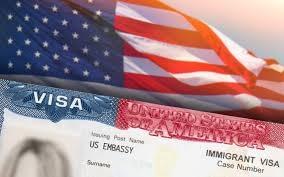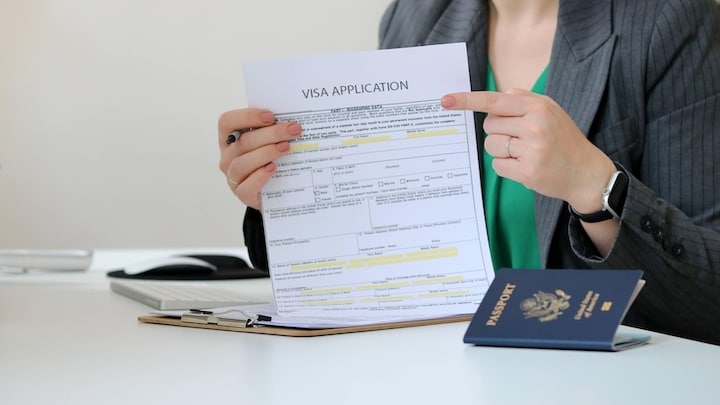USA Immigration Update 2026: New Rules You Need to Know Before You Apply
If you’re planning to move to the U.S. in 2026, you need to understand the latest immigration policy changes. From visa fees and processing times to new digital filing systems and eligibility criteria everything has been updated. These changes affect work visas, green cards, student visas, family petitions, asylum, and the Diversity Visa Lottery.
This guide explains everything in a simple and clear way step by step so you can prepare, avoid delays, and increase your chances of approval.
Updated Visa Processing Timelines
USCIS has revised processing timelines in 2025 to handle rising application volumes and improve fraud detection:

- H-1B, L-1, and O-1 Visas: Now take 5 to 10 months due to additional employer verification.
- Green Cards (Employment-Based): Country-specific wait times still apply. India and China face long delays; other countries move faster.
- Family-Based Visas: Slower in F2A (spouse and children of permanent residents) and F2B (unmarried adult children). Immediate relatives of U.S. citizens remain a priority.
Tips:
- Check your case status on the USCIS Case Tracker.
- Review the Visa Bulletin monthly.
- Submit clean, complete documentation to prevent Requests for Evidence (RFEs).
Read: How to Find Jobs in the USA as an International Candidate
USCIS Filing Fee Increases
To recover operating costs, USCIS has raised fees across most categories:
- H-1B Visa: Approx. $2,000 to $3,000 (includes base + fraud fees).
- Green Card (Form I-485): Increased from $1,140 to $1,540.
- Naturalization (Form N-400): Now $760 (was $640).
- Work Permit (EAD) + Travel (Advance Parole): Now charged separately total cost about $820.
Tips:
- Use the USCIS Fee Calculator to avoid mistakes.
- Budget for additional costs like biometrics ($85), medical exams, and certified translations.
Stricter Public Charge Rules
Green card applicants must prove they won’t rely on public benefits:
- Required Documents:
-
- U.S. tax returns (Form 1040)
- Employer letters, bank statements
- Health insurance evidence
-
- Form I-864 (Affidavit of Support): Sponsors must earn at least 125% of the Federal Poverty Guidelines.
Extra Notes:
- Assets (cars, homes, savings) can help you qualify if income is low.
- The government looks at age, health, work history, credit score, and English ability.
Tighter Rules for Work Visas (H-1B, L-1, etc.)
Work-based visas now require stronger employer proof:

- Higher Wage Standards: Jobs must meet new minimum salary levels set by the Department of Labor.
- Remote Jobs Scrutinized: You must show how the job qualifies for visa sponsorship even if it’s remote.
- Employer Paperwork: Must include detailed job offers, company taxes, LCA certifications, and wage breakdowns.
Tips:
- Have your résumé, certifications, transcripts, and licenses ready.
- Ask your employer to file the LCA early and follow all deadlines.
Read: How to Ace Interviews for Jobs in the USA: Insights from Recruiters
Student Visa (F-1) Changes
Student visa applications are more strict now:
- Proof of Intent to Return: Show ties to your home country (family, job offer, or property).
- Financial Support: You must prove you can pay for tuition + 12 months of living expenses.
- Fewer OPT/CPT Flexibilities: Only STEM students still qualify for a 24-month OPT extension.
Tips:
- Make sure your I-20 form is accurate and updated.
- Bring complete bank statements, sponsor letters, and a tuition payment plan to the interview.
Family Immigration Policy Updates
USCIS is reviewing family petitions more carefully:
- Marriage Visas (CR1, IR1, K-1): You must provide strong relationship evidence (photos, messages, shared bills, travel history).
- Mandatory Interviews: Most couples are interviewed even if previously waived.
- Country-Specific Delays: Mexico, India, and the Philippines still have long waitlists.
Tips:
- Prepare for personal questions: how you met, wedding plans, past visits, family interactions.
- Create a clear, honest relationship timeline with solid proof.
Mandatory Online Applications
USCIS is going fully digital in 2026:

- Required for Most Forms: You must now submit I-130, N-400, I-765, I-131, and more online.
- Benefits of Online Filing:
-
- Faster receipt notices
- Real-time status updates
- Secure document storage
-
Tips:
- Create a free USCIS Online Account.
- Submit forms in high-resolution PDF or JPG format.
Asylum and Humanitarian Changes
Tighter screening and digital access are part of the updates:
- Fast Credible Fear Interviews: Held within days be ready to present threats and evidence.
- CBP One App: You must use it to book asylum appointments at U.S. ports of entry.
- Country-Specific Parole: Only open to select countries (Ukraine, Cuba, Venezuela, Haiti, and Nicaragua).
Tips:
- Hire a licensed immigration attorney many nonprofits offer low-cost options.
- Use encryption and secure cloud backups to store your case evidence.
Read: ETSU Student Leah Loveday Wins Prestigious Truman Scholarship
Diversity Visa Lottery (DV-2026) Changes
The Diversity Visa Lottery has stricter tech and entry rules:
- New Country List: Some previously excluded countries are now eligible.
- Photo Requirements: Must meet precise size and background specs rejections are common for poor photos.
- No Duplicate Entries: Submitting more than once disqualifies you automatically.
Tips:
- Use a professional photo service.
- Apply early, save your confirmation number, and only submit via dvprogram.state.gov.
How to Get Ready for a U.S. Immigration Application in 2026
To avoid delays, you must be organized and ahead of deadlines:
- Know Your Category: Use USCIS Tools to check if you’re eligible.
- Don’t Skip Details: Use the latest forms, sign everything, and include translations where needed.
- Use Legal Help: A lawyer can help you avoid small mistakes that cause major delays.
- Stay on Schedule: Create a checklist for each form and timeline.
- Interview Ready: Dress well, bring all originals, and stay calm and truthful during interviews.
The 2026 immigration rules bring more digital tools, stricter reviews, and detailed requirements. But if you prepare early, stay informed, and follow each step carefully, you’ll have a much better chance at approval whether you’re applying for work, study, family, or humanitarian entry. Use official sources, keep copies of everything, and get help if needed. A small mistake can cause long delays. Getting it right the first time matters now more than ever.
Also, make sure to stay updated as policies can change without much notice. Subscribe to USCIS alerts, follow immigration news, and check the Visa Bulletin every month. If you’re unsure about any step, consult a licensed immigration attorney or accredited representative don’t rely on rumors or outdated advice.
Lastly, stay organized. Keep a folder for each application, track all deadlines, and prepare backup documents in case you’re asked for more evidence. Success with U.S. immigration in 2026 depends on careful planning, accuracy, and patience. Take it one step at a time, and don’t rush your future may depend on it.
